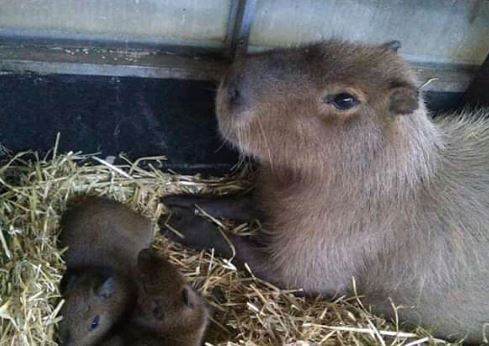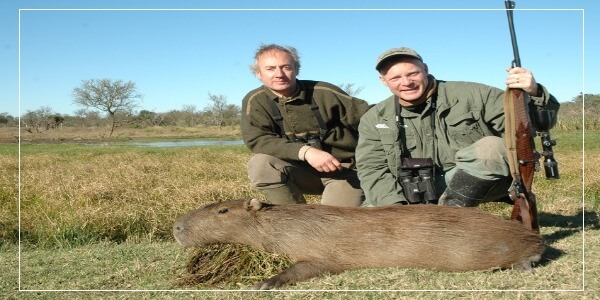With the popularity of pet capybaras, I am sure that several Tennessee residents have explored the chances of keeping a pet capybara.
If you live in the state of Tennessee and you are interested in owning a capybara, you may have to reconsider your options because it is illegal to own a pet capybara in the state. However, certain exotic animals are legal to keep as pets in Tennessee without a license.
It is important to know that owning a capybara comes with lots of demands and responsibilities. It would be best to avoid owning a capybara or any exotic animal in Tennessee as they can be harmful to you, your neighbors, your friends, your family, or the society at large.
What Is a Capybara?
Capybaras are semi-aquatic animals known for their social and friendly nature. They are the largest rodents in the world and are native to South America.
They can grow over 4 feet long and weigh over 140 pounds. The capybara live in groups and tend to form close relationships with one another. They live in the wild near water bodies such as swamps, lakes, ponds, rivers, and marshes.
Capybaras are herbivores, they feed primarily on fresh grasses, fruits, tree barks, and water plants. They have a huge appetite for food and can eat several times a day.
The capybara’s size makes it identical to a large guinea pig. However, the capybara is characterized by its webbed hind feet and yellow or brownish fur.
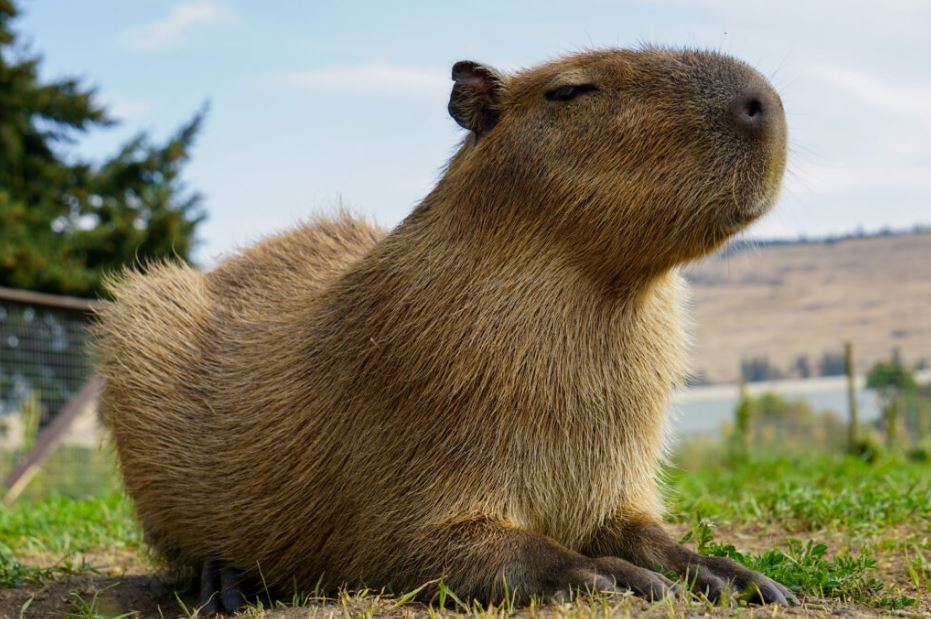
Capybaras are one of the popular exotic pets in the United States. It could take between $1,000 to $3,000 to buy a capybara depending on the breeder, the licensing, permits, and maintenance costs incurred.
You may want to get a pet capybara, but if you are based in the state of Tennessee, you don’t need a permit or license to own one because having a pet capybara in the state is illegal in itself.
However, if you live in a state or region that allows you to keep capybaras as pets, you must be prepared to take up the responsibility of caring for a capybara.
The capybara’s natural habitat is in the wild, where there are varieties of vegetation and proximity to water sources. It may be difficult to keep a capybara in your apartment, as they need a specific diet and environment to stay strong and healthy.
If you must keep a capybara in your home, you must be willing to provide a befitting environment that is spacious and close to water bodies (like a pool constructed for it).
Also, capybaras are docile and social, so they shouldn’t be left in isolation. If you are busy at work or not available at all times, you can consider getting more than one capybara. This way, both capybaras can interact, play, and spend time together.
Since capybaras are grown in the wild, it is likely for them to have diseases, which can be transmitted to you, your family, or pets. If you want to keep a capybara as a pet in your home, it would be best to take it to a vet and check for any infections it may have.
Also, consider consulting the local authorities to know whether it is acceptable in your area. If it is allowed, you must be prepared to provide it with every necessity it needs, including food, housing, and healthcare.
Keeping a capybara is a serious business and responsibility that shouldn’t be done without careful planning and preparation.
Can You Own a Pet Capybara in Tennessee?
At the time of writing, it is illegal to own capybaras in the state of Tennessee. However, regulations can change over time, so try to reach out to the local authorities to know if private ownership of capybaras is allowed.
The Tennessee Wildlife Resources Agency (TWRA) is responsible for the management, supervision, and ownership of exotic animals, including capybaras in the state of Tennessee. They may issue permits and licenses to you if you meet their guidelines and requirements.
One of the ways to get a license to own an exotic animal is to have the necessary facilities to take care of the animal. The TWRA will inspect the facilities to ensure they are up to standard.
Everyone fantasizes about owning a capybara but not everyone can own a capybara. If you want to obtain a capybara licensing, you must ensure you have a quality housing system for these creatures.
Moreover, these rodents must have access to proper welfare, including healthcare, nutrition, and hydration. Capybara owners must prioritize the medical needs of their pets by giving them access to regular veterinary care and checkups.
Factors To Consider When Owning a Capybara In Tennessee?
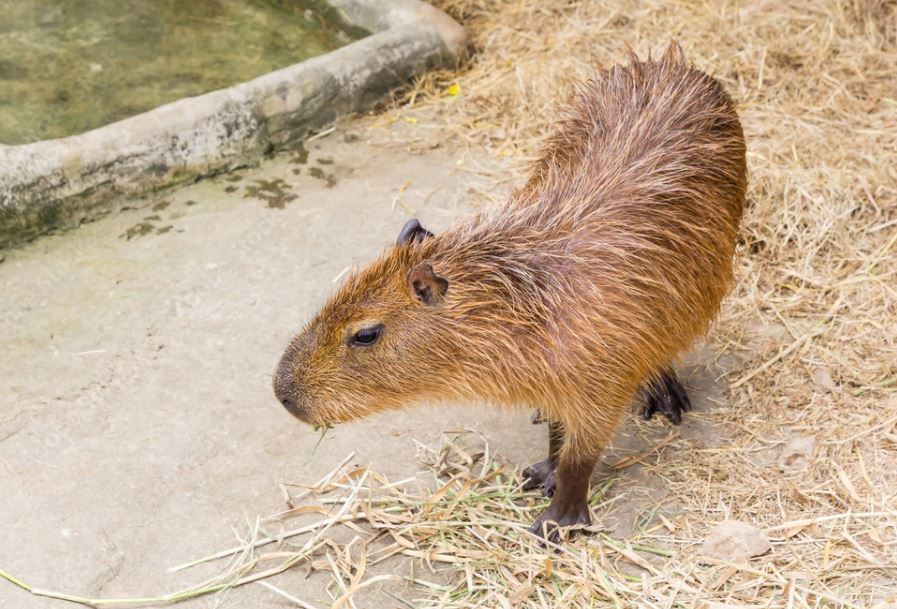
Before going through the stringent process of applying for capybara ownership, it is important to understand the responsibilities associated with capybara ownership.
Getting a capybara may not be difficult; however, failing to care for and provide a good life for the animal will be a sad thing.
Here, we will show you the possible challenges and conditions, which must be considered seriously before owning a pet capybara in your state.
1. Space Requirements
The first thing is to consider the space in your home or apartment. Don’t forget that the capybara is a large animal, so it equally needs enough room to roam and move about.
The capybara will have limited mobility if bred in a tight area. Ideally, you want to ensure that the pet is provided with enough space to move about as it likes.
As semi-aquatic animals, these rodents also needed access to a pool or pond where they could swim or immerse themselves. Having necessary facilities such as a spacious yard and access to water for swimming shows you are prepared to cater to the capybara.
2. Temperature and Climate
Capybaras are native to South American countries like Brazil, Columbia, Venezuela, Ecuador, and others and they stay in warm and tropical areas.
It is important to ensure the capybara stays in an environment that is identical to their natural habitat. The ideal temperature range for breeding a capybara is between 24 – 29 degrees Celsius (75 to 85 degrees Fahrenheit). This is why it’s essential to provide them access to water, where they can get swim and bath to chill, reduce body heat, and regulate their body temperature.
If you will be keeping the capybaras outdoors, maybe in your yard or garden, you should provide a tent where they can get shade from the sun.
3. Feeding, Diet, and Nutrition
Obviously, this is the biggest factor to consider when owning a capybara, as these creatures have specific dietary needs to ensure their well-being.
The capybara diet consists mainly of vegetation, tree barks, and grasses such as aquatic plants, fruits, melons, etc. A capybara can eat over 8 pounds of grasses a day. If you have two capybaras, together, they can consume up to 16 to 20 pounds of grass every day. A capybara needs to feed well to maintain its good shape and stay healthy.
It is important to stay in a region where you can easily access fresh grasses for your pet capybaras as buying specialized capybara food may be costly but it’s fine if you can foot the bills.
Aside from the food, you must provide your capybara with fresh water to drink. The water must be changed constantly to prevent contamination that will lead degrade the animal’s health.
4. Commitment
It would be difficult for one capybara to survive on its own. These rodents are not low-maintenance pets. They require special care and attention.
As a capybara owner, you must be available to feed the animal, clean its tent and pool, play with them, and do other things required of you.
Owning a capybara comes with several responsibilities, so you should be committed to ensuring they are well taken care of. A capybara can live up to 8 or even 12 years if taken care of. Potential owners must understand that it is a long-term commitment.
5. Interaction and Handling
Despite being wild animals, capybaras are friendly, docile, and aren’t as threatening as other exotic animals so they deserve to be treated with care and respect.
The capybara has long, sharp teeth for chewing and cutting grasses. However, it can thrust its mouth to deliver a strong bite if it feels stressed, provoked, threatened, or endangered.
If you treat your pet capybara with care, it will establish a close bond with you and trust you enough to know you can’t harm it.
Potential owners are encouraged to learn proper handling techniques to build a strong, enjoyable relationship with their capybaras.
6. Social Needs
Capybaras are social animals and prefer living in groups. A solitary capy is a bored and sad-living capybara. From their natural habitat in the wild, these rodents cleave to themselves and live in large numbers.
Most times, a herd of capybara contains 10 to 20 members and can grow over 100 members in certain seasons and conditions. It’s far better to buy one than one capybara as solitary confinement will make the animal feel lonely, isolated, stressed, and sometimes, depressed.
Most capybaras get aggressive and sometimes violent when left in solitary confinement. The reason is that no one spends time with them, so they don’t know who to trust and get paranoid when people get close to them.
If you will be buying one capybara, you must be prepared to spend time with it because they value and love companionship. The capybara engages in social interactions with themselves, other animals, and humans. Moreover, your capybara will get to know you more when you spend time with it. These rodents are docile, calm, playful, and friendly in nature.
If you must own two capybaras, you must also understand the maintenance costs.
7. Legal Consequences of Non-Compliance
Some of the factors outlined above will likely be among the requirements and regulations for capybara ownership in Tennessee.
Failure to meet or comply with these regulations may cause serious legal consequences for you. You may be sanctioned, fined, or have your license revoked. Therefore, ensure strict compliance with the TWRA regulations to avoid legal troubles.
Requirements for Owning Capybaras in Tennessee
You must understand that there are steps and requirements, which must be taken before you can have a capybara you can call your own.
In this section, we will see the requirements for owning a pet capybara in the state of Tennessee:
1. Permits and Licenses
If you wish to own a capybara or any exotic animal in Tennessee, the first step is to approach The Tennessee Wildlife Resources Agency (TWRA).
The TWRA issues licenses and permits to prospective owners of exotic pets. Consulting the TWRA and other local wildlife agencies in Tennessee will acquaint you with the details, information, and responsibilities expected of you as a capybara owner.
When equipped with this information, you will have the necessary knowledge and expertise in caring for the animals.
2. Knowledge, Experience, and Expertise
Knowing sufficient information and showing experience in handling capybaras can increase your chances of getting a license in Tennessee.
Demonstrating your expertise and in-depth knowledge of pet ownership proves that you understand the requirements of owning and caring for a pet capybara as well as the risks associated with the animal.
The TWRA may swiftly issue permits and licenses to individuals who show their experience and expertise in handling, caring for, and maintaining the animals.
Depending on your expertise level, the TWRA may recommend you to take advanced training programs, courses, seminars, on workshops about capybara handling, care, and training.
This training will help you learn about capybara care, including feeding, behavior, reproduction, health, etc. The aim of such training programs is to improve owners’ understanding and knowledge about their responsibilities and duties in promoting the well-being of the animals.
3. Quality Housing and Facilities
Prospective capybara owners must provide accommodation coupled with other facilities that meet the standards of the TWRA.
Capybaras require enough space and environment with easy access to water and most importantly, water. You must demonstrate that your facilities are reliable and conducive enough to house a capybara.
If you have a spacious garden or lawn, you can mark out a section where the capybara will stay. Capybaras are not sedentary animals, so they require a spacious environment to explore.
4. Veterinary Care
Like dogs or any other pet, capybara require special attention, especially in the area of healthcare. Prospective capybara owners must provide regular veterinary care for their pets.
Capybaras may have diseases from their environment in the wild or lack essential nutrients, making it important to provide vaccinations and all forms of medical attention to keep the capybara healthy.
Some capybaras are affected by skin diseases while others get scurvy due to a lack of vitamin C in their diet. You don’t have to wait until your pet falls sick before you seek medical help. Make it a duty to provide regular medical checkups for your pet.
Hopefully, fulfilling these requirements above will heighten your chances of owning a pet capybara.
How to Get a Capybara Permit in Tennessee
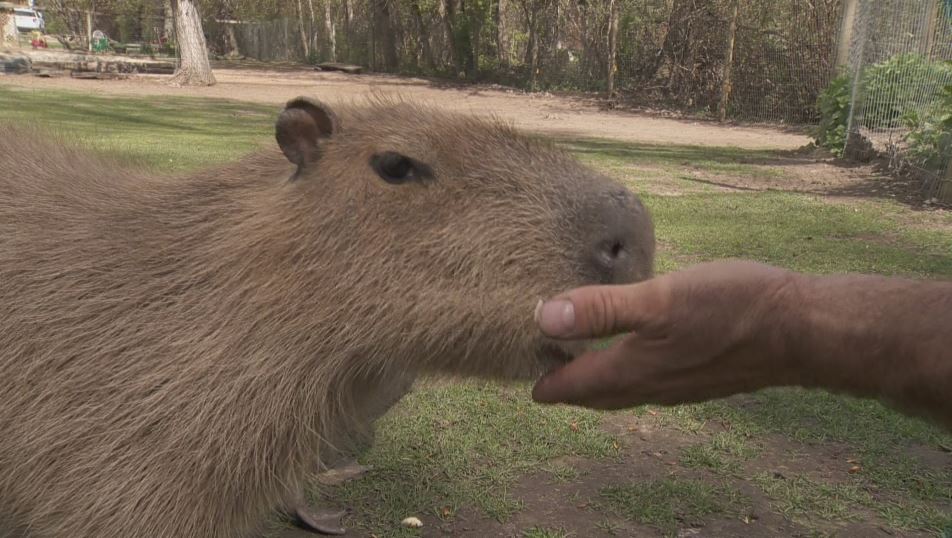
If you are interested in keeping a pet capybara in Tennessee, you must understand that there are legal requirements you must meet. This is the process of procuring a permit to own or keep the pet.
Here, we will tell you everything you need to know to obtain a permit and own a capybara legally in Tennessee.
1. First things first, contact the Tennessee Wildlife Research Agency to get details about the requirements to know your eligibility for owning a capybara in the state.
You can check their website to get their contact information, speak with a representative, or schedule an appointment to visit their office.
2. Get the permit application form and fill in the required feeds with the right information. You can also provide any documents requested from you.
Don’t forget to provide details of yourself, including your personal information, where you work, and proof of residency. It would be a great idea to go with a government-issued ID card.
You can also include information about the capybara you’d like to own, where you would get it from, its medical records, and how you intend to take care of it.
3. Submit the application with supporting documents such as proof of relevant training or experience in exotic animal care, proof of liability insurance coverage, etc.
You may want to include a plan showing the breakdown of the capybara’s breeding such as its accommodation, feeding, veterinary care, and other maintenance costs. This indicates your readiness and preparedness to take care of the animal.
4. The TWRA will review your application and all the information you provided once you submit your application. Keep in mind that the agency may contact you any time during the review process to provide additional information and when they do, you must be willing to provide anything they request.
Unlike Wisconsin, the state of Tennessee has strict laws regarding the ownership of exotic pets. The review process may take some time, so you should give them enough time to go through your application.
When they are done, they will contact you to notify you of the status of your application. Should you meet their requirements and guidelines, they will approve your application and issue you a permit.
5. Don’t get overexcited when you receive a permit from the Tennessee Wildlife Research Agency (TWRA). You should read through the license to understand the terms as well as any clauses, conditions, or limits written in it.
6. After reading the permit, ensure to comply with all the rules and regulations, including maintaining facility standards, routinal checkups, and veterinary care.
If you want a pet capybara so bad but can’t own it in Tennessee, you may consider other states in the United States, with limited oversight over the ownership of exotic pets.
There are several cities in the United States where you can own an exotic pet like a capybara with or without a permit. The table below shows the legal status of capybara ownership in all states in the U.S.
| STATE | LEGALITY |
| Alabama | Legal |
| Alaska | ILLEGAL |
| Arizona | Legal |
| Arkansas | Legal |
| California | ILLEGAL |
| Colorado | ILLEGAL |
| Connecticut | ILLEGAL |
| Delaware | Legal |
| Florida | Legal |
| Georgia | ILLEGAL |
| Hawaii | Legal |
| Idaho | Legal |
| Illinois | ILLEGAL |
| Indiana | Legal |
| Iowa | Legal |
| Kansas | Legal |
| Kentucky | Legal |
| Louisiana | Legal |
| Maine | Legal |
| Maryland | Legal |
| Massachusetts | ILLEGAL |
| Michigan | Legal |
| Minnesota | Legal |
| Mississippi | Legal |
| Missouri | Legal |
| Montana | Legal |
| Nebraska | Legal |
| Nevada | Legal |
| New Hampshire | Legal |
| New Jersey | Legal |
| New Mexico | Legal |
| New York | ILLEGAL |
| North Carolina | Legal |
| North Dakota | Legal |
| Ohio | Legal |
| Oklahoma | Legal |
| Oregon | ILLEGAL |
| Pennsylvania | Legal |
| Rhode Island | Legal |
| South Carolina | Legal |
| South Dakota | Legal |
| Tennessee | Legal |
| Texas | Legal |
| Utah | Legal |
| Vermont | ILLEGAL |
| Virginia | Legal |
| Washington | Legal |
| West Virginia | Legal |
| Wisconsin | Legal |
| Wyoming | Legal |
Should You Own a Pet Capybara In Tennessee?
While you are enthusiastic about being a Capybara owner, there are multiple reasons that suggest why it is a bad idea to own a Capybara in Tennessee.
To start with, the Tennessee Department of Agriculture abhors the possessions of a capybara. Owning a capybara in the state can result in heavy fines or get you imprisoned. This is why you must consult several local wildlife agencies and authorities before exploring the possibility of owning a capybara.
Although it is illegal to own a capybara in Tennessee, you can get a permit or license from the appropriate authorities if you show solid reasons why you own it and state how it will not cause public harm or damage while under your custody.
Capybaras can pose a danger to people, their families, and neighbors. These rodents can destroy farms, and properties, and cause various forms of damage.
Not to forget, they have strong, long teeth, which they can use to inflict injuries on others, dig large holes in furniture, remove wall covering, and vandalize other items in your home.
They can do a lot of damage to items, which are costly to maintain or repair. On the other hand, taking these rodents outside wouldn’t make them to be of good behavior as they can cause irrecoverable damage to your garden.
Besides, they can get loud, which can be offensive to your neighbors. Capybaras require a lot of care and attention and failure to provide this can cause them to become a nuisance and even spread diseases. These rodents are carriers of diseases like leptospirosis, which can be spread from bites, their poop, etc.
Large animals that typically weigh over 140 pounds shouldn’t be kept in residential areas as they can be harmful to you, your family, and those around you.
The capybara requires a specific environment to be kept and it can be difficult to mimic or replicate its natural habitat in a conventional home or apartment.
Failure to provide your pet capybara with its specific diet and environment will make it fall ill or even die. These reasons above will make you see why owning or keeping a pet capybara in Tennessee is a bad idea.
Conclusion
Before purchasing a capybara from any breeder, it is important to check if the Tennessee laws approve it. Laws and regulations are modified and sometimes, changed over time.
If you must obtain a permit or license to keep a capybara, you must demonstrate why a capybara should be entrusted to your care.

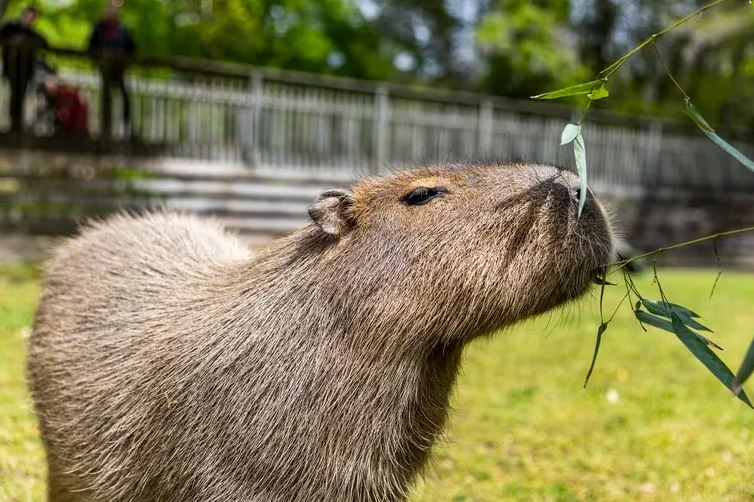
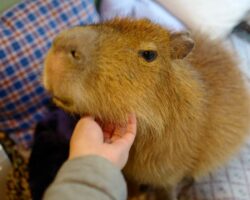
![Capybara Meat And Its Culinary Uses - [Every You Should Know] Capybara Meat & Culinary Uses](https://capybaratips.com/wp-content/uploads/2023/03/Capybara-meat-250x200.webp)
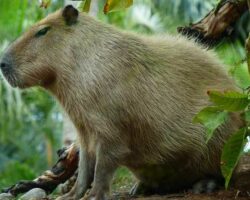
![How To Get A Capybara In China [Steps By Steps] China-Capybara](https://capybaratips.com/wp-content/uploads/2023/03/China-Capybara-250x200.webp)
![Where Can I Buy a Capybara Near Me? - [Recommended] Where Can I Buy a Capybara Near Me](https://capybaratips.com/wp-content/uploads/2023/03/Near-Me-250x200.webp)
![How To Get a Pet Capybara Uk [Step By Step] How To Get a Pet Capybara Uk](https://capybaratips.com/wp-content/uploads/2023/03/Uk-Capybara-250x200.webp)
